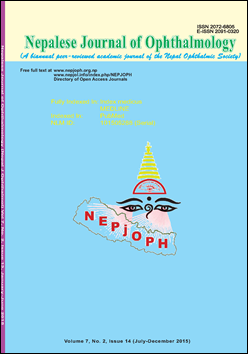Unilateral visual loss due to central retinal artery occlusion with total ophthalmoplegia following cervical spine surgery in prone position
DOI:
https://doi.org/10.3126/nepjoph.v7i2.14978Keywords:
Visual loss, Central retinal artery occlusion, Ophthalmoplegia, spine surgery, Prone positionAbstract
Background: Blindness after spinal surgery is a rare complication, but it is serious, irreversible and incurable. Central retinal artery occlusion (CRAO) is rare after spinal surgery and ophthalmoplegia is even rarer.
Case: A 52-year-old male patient complained of loss of vision in right eye immediately after cervical spine surgery. On examination, the patient’s visual acuity in right eye was absent perception of light. Right eye pupil was dialated and relative afferent pupillary defect (RAPD) was present. Extraocular movements were absent in all gazes in right eye. Intra-ocular pressure (IOP) was 26 mmHg in right eye and 16 mmHg in the left. Posterior segment examination revealed blurred disc margin with ischemic whitening of retina, thin and attenuated retinal arterioles and a central cherry red spot in right eye. Left eye was essentially normal.
Observations: The causal factors of blindness in the patient were likely ischemia of the retina after venous congestion or temporary arterial occlusion resulting from changes in pressure to the tissues of the orbit. Factors including prolonged prone positioning with head end dependent position and possibility of orbital compression by the headrest could have contributed to impaired venous drainage, increase in IOP and reduction in perfusion pressure.
Conclusion: Loss of vision post spinal surgery is a rarest of complication yet grave and irreversible. Because the problem involves mainly prone positioning of the patient, an appropriate position should be found so that facial and ocular compression can be avoided.
Downloads
Downloads
Published
How to Cite
Issue
Section
License
This license enables reusers to copy and distribute the material in any medium or format in unadapted form only, for noncommercial purposes only, and only so long as attribution is given to the creator.




